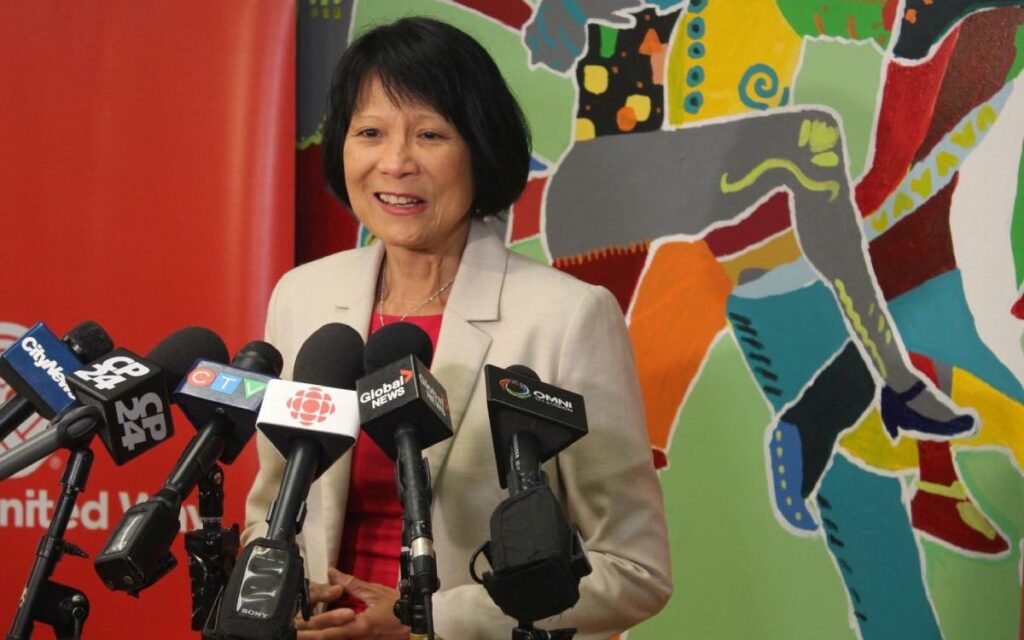
There’s plenty the newly elected mayor can do, from pulling the plug on the city’s costly privilege of hosting a handful of FIFA World Cup games in 2026 to opening up the tendering process. Photo credit: Twitter/Olivia Chow
Olivia Chow won Toronto’s mayoral by-election promising to spend hundreds of millions of dollars the city doesn’t have. Cash-strapped Toronto is already facing a $1 billion budget gap and is legally required to balance the books. Thankfully, taxpayers have a few ideas about where Chow can find savings.
Toronto’s mayor-elect wants to spend more money on virtually every line item in the city’s budget. Housing? More money. Transit? A massive infusion of taxpayer cash. Arts and culture? The more money the merrier.
And how will the city pay for all of Chow’s spending plans? So far, Chow won’t say.
During the campaign, Chow refused to rule out hiking property taxes. So, it’s pretty safe to say that she will try to raise property taxes next year.
In terms of specifics, Chow did commit to introducing a luxury homes tax. But such a tax will do little more than drive wealthy buyers to the suburbs.
It also won’t pay for even a small fraction of Chow’s spending wish list.
That’s where Chow’s plans to fund her big-spending programs end. Her wish list is a mile long, but her plans to meet the city’s budget challenges could fit on a napkin.
One positive sign is that Chow promised to launch a listening campaign after she won the mayoral election.
The answer shouldn’t be immediately bolting toward higher taxes, which will only make life more difficult for cash-strapped Torontonians. There are a few key steps Chow can take that would put the city on a path toward sustainable finances.
First, Chow should seriously rethink Toronto’s plans to host a handful of World Cup games in 2026. The bill will be at least $290 million. If Chow doesn’t get more private sector buy-in, hosting FIFA will cost taxpayers $644,000 for every minute players are on BMO Field. Unless something changes, it’s time to pull the plug on former mayor John Tory’s FIFA pipedream.
A second way Chow can look to close the budget gap is through opening up Toronto’s tendering process. Right now, a significant portion of Toronto’s construction contracts are reserved for companies tied to big unions.
A report by Cardus, a non-partisan thinktank, says Toronto could save $350 million a year by following in the footsteps of every other major Ontario city and ending its closed-tendering process. Chow rejected the idea during the campaign, but with a huge budget shortfall, it’s time for her to do a rethink.
Third, Chow needs to initiate a line-by-line review of the city budget. For every example of waste taxpayers do know about, there’s likely several more that we don’t. Few can forget that the city spent $160,000 installing bike lanes in Scarborough in 2020, only to spend $80,000 tearing them out five months later. It’s time for a serious spending review that trims the fat and makes sure Toronto is spending on major priorities.
Finally, Chow should think about returning Toronto to 2022 spending levels. Doing so would immediately erase Toronto’s entire billion-dollar budget gap.
Toronto’s new mayor is facing a lot of challenges at city hall and won’t have much time to make crucial decisions. She also has an ambitious list of election promises with few specifics about how to pay for them. Chow should look to find savings by prioritizing spending. And yes, that includes scaling back her own favoured projects.
But first, the new mayor needs to do the obvious things. Chow should get taxpayers off the hook for the FIFA bill, open up the construction tending process, do a serious review of all city spending and look at rolling the budget back to 2022 levels.

Jay Goldberg is the Ontario Director at the Canadian Taxpayers Federation. He previously served as a policy fellow at the Munk School of Public Policy and Global Affairs. Jay holds a Ph.D. in Political Science from the University of Toronto.




















